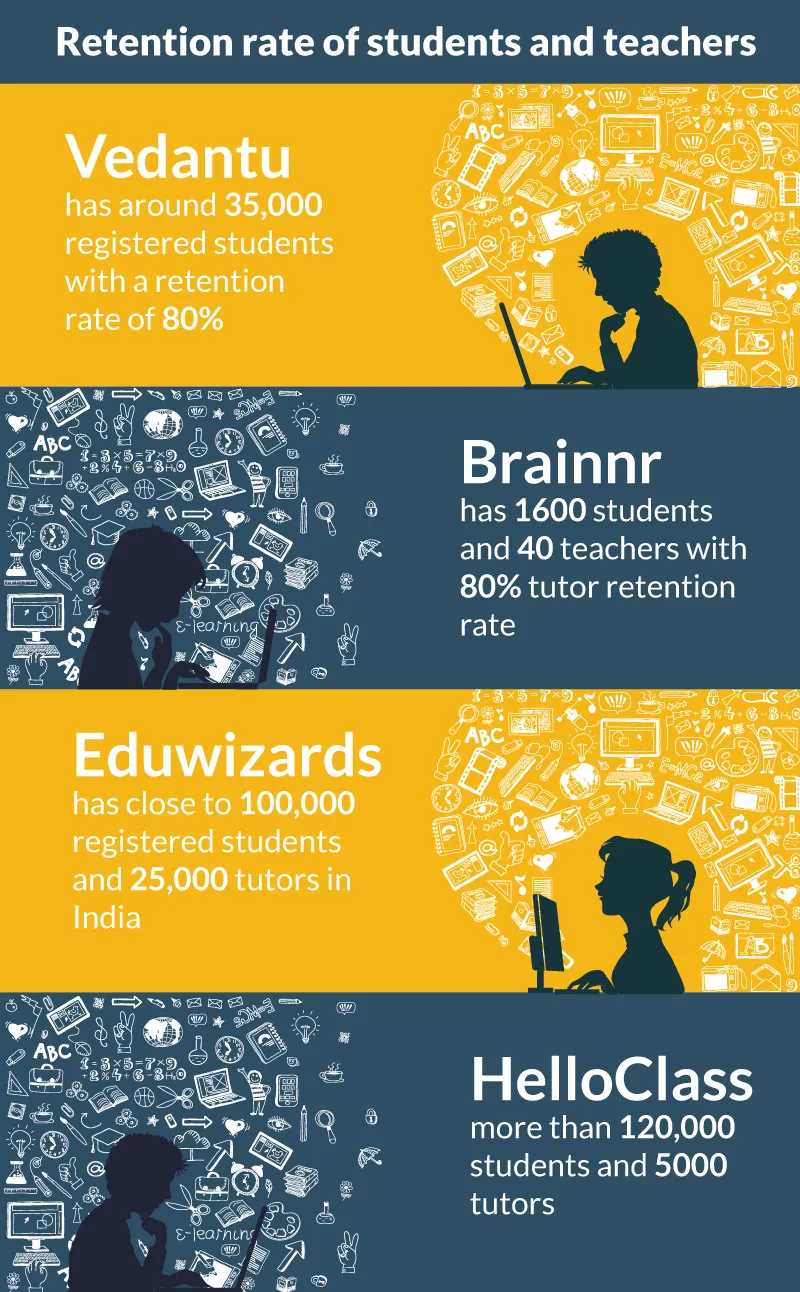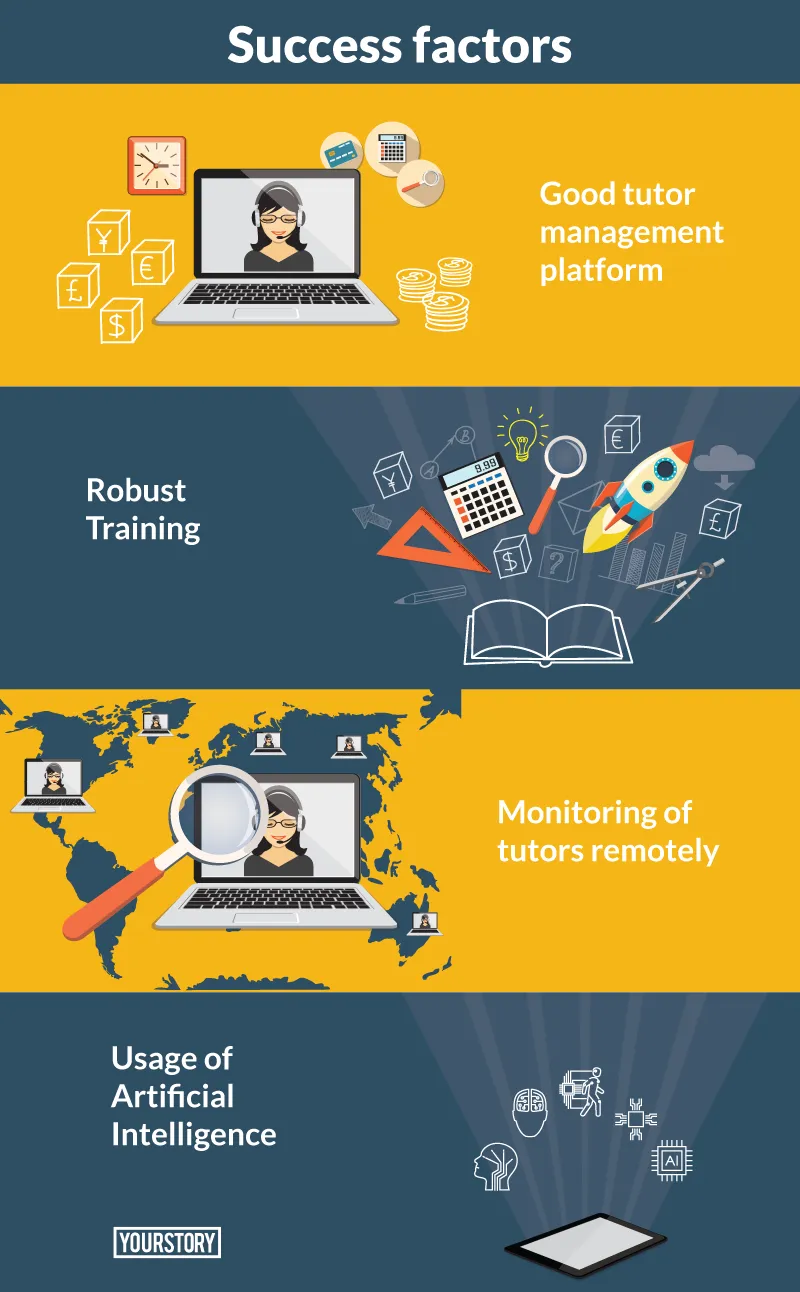What will define the growth of the online tutoring market in India?
Students from primary classes to Class XII are now actively leveraging websites and apps in their search for excellent tutors. In the last few years, the approach of the parent, teacher, and student fraternity in India has been veering towards the online world, especially in urban and semi-urban India. A handful of startups rode high on this behavioural change and succeeded in the online tutoring domain.

India has 100 million students in private schools with a shortage of two million teachers. Addressing the needs of the current generation of students can be a large business opportunity. Online tutoring is a nascent market and companies need to build integrated and scalable models,” says K Ganesh, serial entrepreneur and Partner, GrowthStory.
He adds that beyond just connecting teachers and students, one should have the ability to map coaching to respective curriculum and syllabus. To succeed, companies need to have a good tutor management platform, robust training, remote monitoring of tutors, and tools and techniques using analytics and artificial intelligence (AI) to ensure an effective outcome for each student.
But preserving the retention rate of students and minimising the attrition rate of tutors will define a startup's growth and sustainability in this domain.
Keep the ball rolling
Our tutor attrition rate in Vedantu is almost negligible and the student retention rate is 80 percent,” says Vedantu Co-founder and CEO Vamsi Krishna.
The company operates on a marketplace model where the teacher gets 70-80 percent of the total fees received and the rest is kept as margin. Growing at a rate of 25 percent month on month, Vedantu has around 35,000 registered students on the platform.
It has completed more than one lakh hours of live tutoring on the platform from over 300 cities (60 percent of which would be from Tier II and III cities). However, Vamsi points out that educating parents and students on the concept of live online tutoring still poses a challenge.

Brainnr, a Mumbai-based online tutoring destination for IGCSE board, claimed to have a tutor retention rate of 80 percent. Its rigorous training process serves as a catalyst for many teachers, who have signed up committing two years with the company. Its student report card feature tracks the students tutoring session and sends performance analysis to parents.
At present, Brainnr has 1,600 students and 40 teachers and it receives a percentage of commission from the earnings of teachers.
The challenges to Eduwizards tutoring platform are the well-funded horizontals that provide all services like plumbers, wedding photographers, tutors etc,” says Ashish Sirohi, Co-founder and CEO, Eduwizards.
Having a presence in Noida and New Jersey, Eduwizards provides both offline and online tuition and has close to 1,00,000 registered students and 25,000 tutors in India covering 50 cities.
Eduwizards gives students a free demo tuition session but offers no further discounts to students or tutors. Eighty percent of the total tutoring sessions are paid sessions. Growing at a rate of 30 percent month on month, the company offers free online testing and practice exams to students who take regular tutoring.
Demand-supply gap
From schools, colleges to coaching centres, the education sector in India is still striving to meet the demand for good teachers. It is estimated that India currently has a shortage of 1.4 million trained teachers. University Grants Commission, therefore, urged all the Central universities to set up a department of education.
HelloClass Co-founder and CEO Prakash Rengarajan says,
There are not enough good teachers in the sector to meet the demand from the estimated 250-300 million students in India. We too face the same challenge with demand for tutors exceeding supply.”
Backed by Growth Story, HelloClass is an app that connects students and teachers and provides solutions to all academic-related queries. The app has more than 1,20,000 students (50 percent of them are from Tier II and III cities) and 5,000 tutors.
Prakash added that more than 80 percent of tutoring sessions in HelloClass is taken by repeat students. And the tutor attrition rate is very low given the stringent selection process.
HelloClass has a monthly subscription model with multiple packages targeting different student segments. The startup is claimed to be growing by 100 percent month on month.
An opportunity with K12 education system
The size of private tutoring in India in k12 is around $15 billion, of this 15 percent should get converted into online by 2020,” points out Vamsi of Vedantu.
With over 259 million K12 enrolments in 2015 alone, India has become the largest K12 education system in the world. The number is expected to grow to 335 million by 2022.
BYJU founder and CEO Byju Raveendran is of the view that India, despite having the largest K12 education system, ranks low in all global education assessments due to lack of access to good teachers and a one-size-fits-all teaching approach.
BYJU has developed a K12 learning app that offers adaptive, engaging and effective learning programmes for students in Classes IV-XII and competitive exams like JEE, NEET, CAT, IAS, GRE, and GMAT. Students use the app for engaging video lessons from the best teachers.
BYJU’s has over 5.5 million downloads, 2.5 lakh annual paid subscriptions and sees an addition of 30,000 students every month. From Rs 4 crore in FY12, the firm has reached Rs 125 crore in FY16 in revenue growth.
Vidyanext equips both tutors and students with tablet devices that contain course materials for students. “We serve students from Class IV to XI and in this segment, we estimate a nationwide market size of 70 million students who will be taking tuitions and availing our services. It translates to about Rs 21,000-crore market opportunity. However, we see some apprehension among tutors to adopt and use the technology to its fullest potential,” says Vidyanext Co-founder Pradeep Singh.
Teachers can provide personalised attention to each student with reporting and collaboration tools. So far 300 students have bought their tablets.
There are different sub segments that are emerging in the online tutoring space, where focus can be purely on test prep or facilitation of content (K12) or just creating access to the right instructors using technology. Overall, this is a massive opportunity with digital consumption becoming more prevalent and convenient for students,” says Vinod Murali, MD, InnoVen Capital.
InnoVen Capital has been in the forefront of supporting edtech companies including Byju's Classes, Toppr, Simplilearn, Embibe, Superprofs, and Edusys.
Why the market is here to stay
A report by the National Sample Survey Office (NSSO) revealed that 20 percent of Indians pursuing degree courses and 13 percent pursuing post-graduate courses and above avail private tuition. Tutoring as an industry is estimated to be $11 billion, growing 11–12 percent year on year and is expected to touch $16 billion by 2017.

Online videos of a tutor teaching either live or as a pre-recorded package, and online marketplace for tutors collectively form the online tutoring market. The supplementary education market in India for school students is estimated to be close to $25 billion and is expected to touch $30 billion by 2020. Live online tutoring constitutes less than one percent of this market but is expected to grow significantly with the increased intervention of technology.
Fear of exams and securing good marks eventually take away the charm of learning. There is a huge scope for edtech startups to change the consumption pattern and make students become enthusiastic learners.
More than the transition from offline to online, the pedagogical pattern and the way of delivering content should be changed. The need of the hour is to make learning more engaging and appealing with the usage of technology.
The future of online tutoring is extremely promising, with less than one percent of the market being addressed. The market will involve usage of online, app-based, specific content-driven, personalised tutoring. We will see lot of use of analytics, AI in adapting to the individual learning styles and methods,” says K Ganesh.







